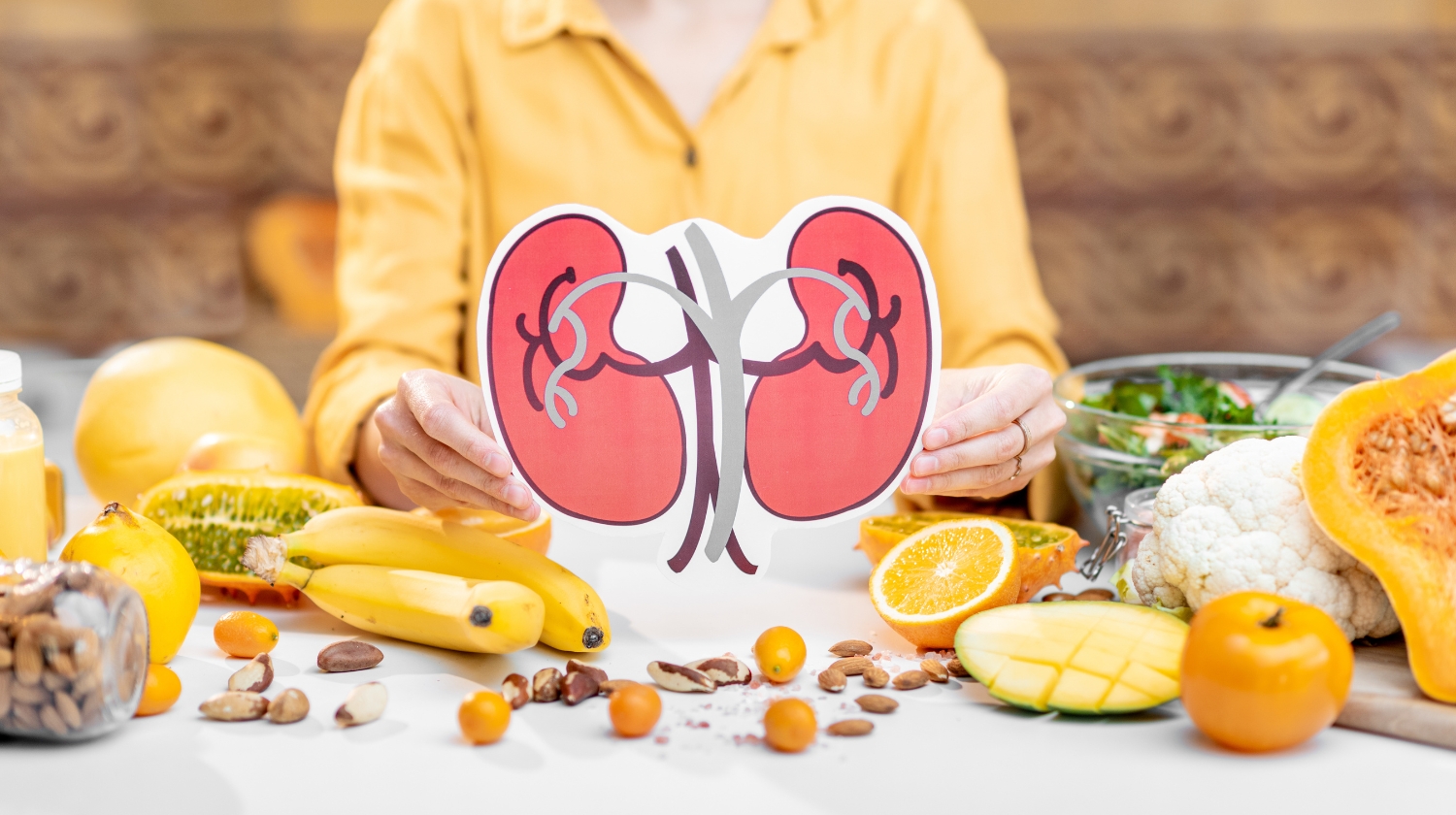Kidney Stone Diet Chart: Everything You Need To Know

Imagine a world where the journey to kidney health[1] begins with the choices you make on your plate. A world where you can take charge of your well-being and combat the dreaded kidney stones through the power of a balanced diet. Welcome to the realm where nutrition becomes your knight in shining armor against those pesky stone-forming culprits.
Join us on an enlightening journey as we delve into the recommended do’s and don’ts of diet for kidney stones. Discover how certain foods can be both allies and adversaries in your battle against these crystal invaders.
So, tighten your apron strings, sharpen your culinary curiosity, and let’s embark on a gastronomic odyssey that promises to safeguard your precious kidneys. Keep reading to find out more!
Kidney Stone Diet Chart
The recommended diet chart for kidney stones involves being cautious of foods high in oxalate content for calcium oxalate stones, such as spinach, rhubarb, and nuts. For uric acid stones, it is advised to avoid or limit foods rich in purines like organ meats, red meat, and certain seafood. Lowering sodium intake and drinking plenty of water are important for preventing kidney stone formation. Following a moderate protein intake is also recommended. It is crucial to consult with healthcare professionals or registered dietitians for personalized advice and guidance.

Recommended Diet Chart For Kidney Stones

Calcium Oxalate Stones
When it comes to managing calcium oxalate kidney stones, it is important to be mindful of certain foods that are known to be high in oxalate content. Oxalate[2] is a naturally occurring substance found in many foods and can contribute to the formation of kidney stones in susceptible individuals. By avoiding or limiting the consumption of these calcium rich foods and oxalate foods you can reduce your risk of developing calcium oxalate kidney stones. Here are some foods to be cautious of:
- Spinach: While spinach is a nutrient-dense vegetable, it is also high in oxalate. Consider reducing your intake or choosing alternative greens like kale or lettuce.
- Rhubarb: Rhubarb, known for its tart flavor, is commonly used in desserts and jams. However, it is one of the highest oxalate-containing foods and should be avoided if you are prone to kidney stones.
- Beet Greens: Similar to spinach, beet greens are rich in oxalate. If you enjoy the taste of beet greens, consider removing the leaves and enjoying the root portion instead.
- Swiss Chard: Swiss chard, although nutritious, is also high in oxalates. Moderation is key if you decide to include it in your diet.
- Nuts and Seeds: Some nuts and seeds, such as almonds, cashews, peanuts, and sesame seeds, are relatively high in oxalate. While they provide healthy fats, it is important to consume them in moderation if you have a history of kidney stones.
- Chocolate: Chocolate, particularly dark chocolate, contains oxalates and should be consumed sparingly if you are prone to calcium oxalate stones. Opting for lower oxalate alternatives or enjoying chocolate in small quantities may be a better choice.
- Tea: Certain teas, such as black tea and green tea, contain oxalates. Although hydration is important for kidney stone prevention, consider choosing herbal teas that are free of oxalates.
- Soy Products: Soy-based foods, including tofu, soy milk, and soybeans, are high in oxalate. If you are following a plant-based diet, ensure you balance your intake of oxalate-rich foods with low-oxalate alternatives.
- Whole Wheat: Whole wheat products, including bread, pasta, and cereals, contain moderate amounts of oxalate. If you are prone to kidney stones, consider opting for alternatives like rice, quinoa, or oats.
Remember that the tolerance to oxalate-rich foods can vary between individuals, and it is important to consult with a healthcare professional or registered dietitian for personalized advice. They can provide guidance on managing your diet to minimize the risk of calcium oxalate kidney stones and promote overall kidney health.
Uric Acid Stones
When dealing with uric acid kidney stones[3], it’s crucial to be mindful of your diet and avoid certain foods that can contribute to the formation of these stones. Not all acid foods necessarily lead to kidney stones. Check out this article on apple cider vinegar for kidney stones and this article on the best apple cider vinegar gummies. Uric acid stones form due to high levels of uric acid in the urine, which can be influenced by dietary factors. Here are some foods to avoid or limit if you’re prone to uric acid kidney stones:
- Organ Meats: Avoid or reduce the consumption of organ meats such as liver, kidneys, and sweetbreads. These meats are high in purines, which can lead to elevated uric acid levels in the body.
- Red Meat: Red meat, including beef, lamb, and pork, contains moderate to high levels of purines. Limit your intake and opt for leaner sources of protein like poultry or fish instead.
- Seafood: Certain types of seafood are high in purines and should be consumed in moderation. Examples include anchovies, sardines, mussels, scallops, and herring.
- Shellfish: Shellfish like shrimp, lobster, crab, and mussels are known to have moderate to high purine content. Limit your consumption or choose low-purine seafood options like fish or shellfish with lower purine levels.
- Alcohol: Alcohol, especially beer, can contribute to the formation of uric acid kidney stones. It can increase uric acid production and impair its excretion. Limit or avoid alcohol consumption, particularly beer, if you’re prone to uric acid stones.
- Sugary Beverages: High-sugar beverages, such as soda and fruit juices, can contribute to the formation of uric acid stones. They can increase the excretion of uric acid in the urine. Opt for water or unsweetened drinks as your main source of hydration.
- High-Fructose Foods: Foods with high fructose content, such as sweetened cereals, sweetened yogurts, and certain fruits (e.g., grapes, cherries, and pineapples), can increase uric acid levels. Limit your intake of these foods and choose lower fructose alternatives.
- Certain Vegetables: While most vegetables are generally safe, some vegetables, such as spinach, asparagus, and mushrooms, are moderately high in purines. Consume them in moderation and balance them with other low-purine vegetables.
It is important to note that dietary modifications should be made in consultation with a healthcare professional or registered dietitian. They can provide personalized guidance based on your medical history, overall health, and individual needs to help prevent uric acid kidney stone formation and promote kidney health.
Kidney Stone Diet Chart: General Recommendations

Eat A Moderate Amount Of Protein
Consuming a moderate amount of protein[4] can help decrease the risk of kidney stone formation. When protein is broken down in the body, it produces waste products, including uric acid and certain minerals that can contribute to stone formation. By maintaining a moderate protein intake, the load on the kidneys is reduced, resulting in lower levels of these waste products. It is important to strike a balance for a healthy diet, as both excessive protein intake and inadequate protein intake can have negative effects.
Limit Salt Intake
Reducing sodium intake[5] when forming a diet plan for kidney stone prevention can play a significant role in decreasing the risk of kidney stone formation. High sodium levels in the body can lead to increased calcium excretion in the urine, which can contribute to the formation of certain types of kidney stones. By lowering sodium intake and salty foods, the kidneys can better regulate calcium levels and prevent excessive calcium excretion. Limiting processed foods, fast food, canned soups, and salty snacks, and opting for fresh, whole foods can help reduce sodium consumption. Maintaining a balanced and low-sodium diet, along with adequate hydration, can help prevent kidney stone formation.
Drink Lots Of Water
Increasing fluid intake[6] is crucial in reducing the risk of kidney stone formation. Ample hydration helps dilute urine and prevents the concentration of minerals and substances that form stones. It promotes more frequent urination, flushing out potential stone-forming substances from the urinary tract. Adequate fluid intake, especially water, maintains optimal urinary flow and prevents urine from becoming too concentrated. Aim for at least 8 glasses of water per day, or more if recommended by a healthcare professional. It is particularly important to maintain hydration during hot weather or physical activity. Increasing fluid intake is a simple yet effective strategy for kidney stone prevention. To learn more about how much water you should drink per day, read this article!
Avoid Excessive Vitamin C Supplementation
High doses of vitamin C[7] can be metabolized into oxalate, potentially increasing the risk of calcium oxalate stone formation. If you take vitamin C supplements, do so in moderation and consult with a healthcare professional.
To find out more ways to get rid of kidney stones, check out this article!
Conclusion
In conclusion, managing kidney stones requires a careful approach to your diet. For calcium oxalate stones, it is important to be mindful of high oxalate foods like spinach, rhubarb, and nuts. Uric acid stones can be prevented by avoiding or limiting foods rich in purines, such as organ meats, red meat, and certain seafood.
Additionally, reducing sodium intake and drinking plenty of water are essential for preventing kidney stone formation regardless of the stone type. Following a moderate protein intake, limiting salt, and staying hydrated are key components of a recommended diet chart for kidney stones.
Supplements can also be helpful in getting rid of kidney stones, check out some of Skinnyfits supplements now! Always consult with a healthcare professional or registered dietitian for personalized advice and guidance, especially for kidney stone patients.
+ 7 sources
Health Canal avoids using tertiary references. We have strict sourcing guidelines and rely on peer-reviewed studies, academic researches from medical associations and institutions. To ensure the accuracy of articles in Health Canal, you can read more about the editorial process here
- Siener, R. (2021). Nutrition and Kidney Stone Disease. [online] 13(6), pp.1917–1917. doi:https://doi.org/10.3390/nu13061917.
- Massey, L.K., Roman-Smith, H. and Roger A.L. Sutton (1993). Effect of dietary oxalate and calcium on urinary oxalate and risk of formation of calcium oxalate kidney stones. [online] 93(8), pp.901–906. doi:https://doi.org/10.1016/0002-8223(93)91530-4.
- Khashayar Sakhaee (2014). Epidemiology and clinical pathophysiology of uric acid kidney stones. [online] 27(3), pp.241–245. doi:https://doi.org/10.1007/s40620-013-0034-z.
- Leonardo Ferreira Fontenelle and Thiago Dias Sarti (2019). Kidney Stones: Treatment and Prevention. American Family Physician, [online] 99(8), pp.490–496. Available at: https://www.aafp.org/pubs/afp/issues/2019/0415/p490.html [Accessed 6 Jun. 2023].
- FRASSETTO, L. and KOHLSTADT, I. (2011). Treatment and Prevention of Kidney Stones: An Update. American Family Physician, [online] 84(11), pp.1234–1242. Available at: https://www.aafp.org/pubs/afp/issues/2011/1201/p1234.html [Accessed 6 Jun. 2023].
- Wisit Cheungpasitporn, Rossetti, S., Friend, K., Erickson, S.B. and Lieske, J.C. (2016). Treatment effect, adherence, and safety of high fluid intake for the prevention of incident and recurrent kidney stones: a systematic review and meta-analysis. [online] 29(2), pp.211–219. doi:https://doi.org/10.1007/s40620-015-0210-4.
- Ferraro, P., Curhan, G.C., Gambaro, G. and Taylor, E. (2016). Total, Dietary, and Supplemental Vitamin C Intake and Risk of Incident Kidney Stones. [online] 67(3), pp.400–407. doi:https://doi.org/10.1053/j.ajkd.2015.09.005.



